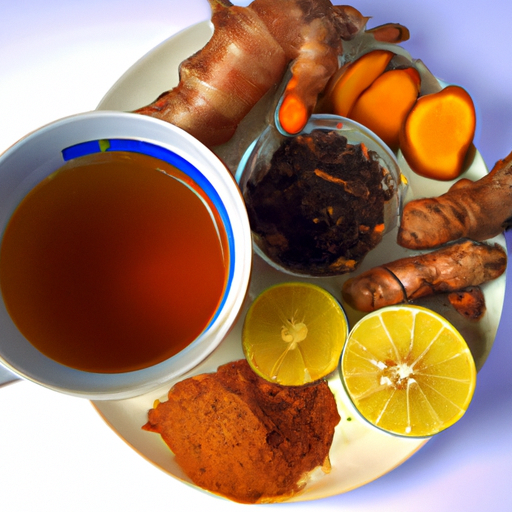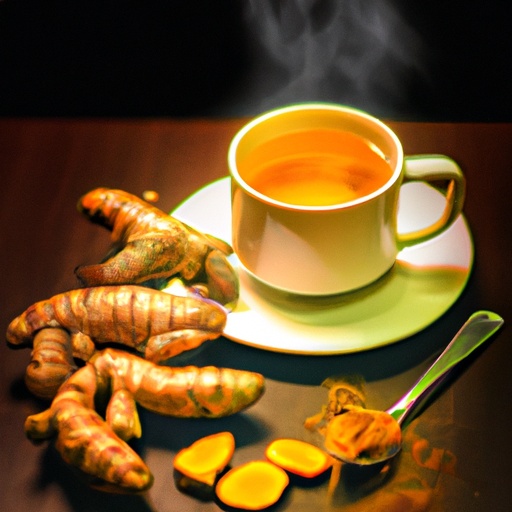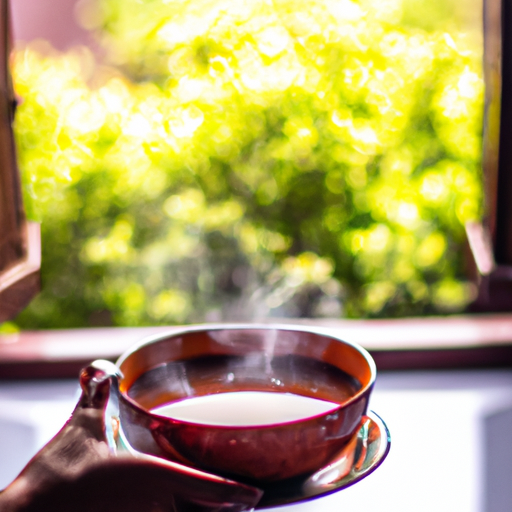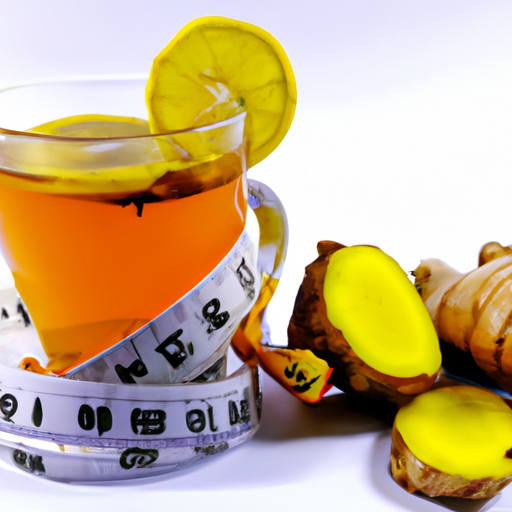As a person who has consistently harbored an interest in natural health solutions, I found myself intrigued by the possible advantages of ginger turmeric tea. Upon conducting some investigation, I learned that this tea is loaded with potent antioxidants and compounds with anti-inflammatory properties, which could aid in addressing various health conditions.
In this article, I’ll be sharing what I’ve learned about ginger turmeric tea, including its ingredients and how to make it. Additionally, I’ll discuss the potential health benefits of this tea and offer some safety considerations to keep in mind before incorporating it into your daily routine.
Whether you’re looking for a soothing drink to combat inflammation or simply want to explore new ways to boost your overall wellness, ginger turmeric tea may be worth considering.
Key Takeaways
- Ginger turmeric tea is a natural remedy packed with powerful antioxidants and anti-inflammatory compounds.
- It can help with a range of health issues, including digestive issues, immune system boost, improved brain function, and lower cholesterol levels.
- Both ginger and turmeric contain antioxidants that protect cells from damage caused by free radicals, and can reduce inflammation markers in the body.
- Choosing high-quality ingredients is essential for getting all of those amazing health benefits from your tea.
What is ginger turmeric tea?
Ginger turmeric tea is a delicious and warming blend of two powerful spices that have been used for centuries in traditional medicine. It’s made by steeping fresh ginger root and ground turmeric in boiling water, creating a fragrant herbal tea that’s rich in antioxidants and anti-inflammatory compounds.
This tea has become increasingly popular as people seek natural remedies to improve their health and wellness. There are many different herbal tea varieties available on the market today, but ginger turmeric tea stands out for its unique flavor profile and impressive health benefits.
Ginger is well-known for its ability to soothe digestive issues like nausea, bloating, and indigestion. Turmeric, on the other hand, contains curcumin – a potent antioxidant that has been shown to reduce inflammation throughout the body. Together, these two ingredients work synergistically to provide a wide range of health benefits.
In addition to aiding digestion and reducing inflammation, ginger turmeric tea may also help boost your immune system, improve brain function, lower cholesterol levels, and even reduce your risk of chronic diseases like cancer and heart disease. With so many potential benefits packed into one delicious drink, it’s no wonder why ginger turmeric tea has become such a popular choice among health-conscious individuals everywhere!
The Health Benefits of Ginger Turmeric Tea
You can improve your overall health by regularly drinking this delicious tea that’s been shown to reduce inflammation in the body. Ginger turmeric tea is a powerful anti-inflammatory drink that can help boost your immune system and prevent chronic diseases.
This tea contains two potent ingredients: ginger and turmeric, both of which have been used for centuries for their medicinal properties. If you’re looking for a natural way to reduce inflammation in your body, then ginger turmeric tea is an excellent choice.
Here are three ways this tea can benefit your health:
-
Boosts Immune System – Ginger and turmeric are known to have antibacterial, antiviral, and anti-fungal properties that help strengthen the immune system.
-
Reduces Inflammation – Chronic inflammation is linked to many diseases such as cancer, heart disease, diabetes, and Alzheimer’s. Studies show that ginger and turmeric can reduce inflammation markers in the body.
-
Provides Antioxidants – Both ginger and turmeric contain antioxidants that protect cells from damage caused by free radicals.
Incorporating ginger turmeric tea into your daily routine is easy! Keep reading to learn how to make this healing beverage at home with just a few simple steps.
How to Make Ginger Turmeric Tea
Get ready to indulge in a warm and comforting beverage that’s easy to make at home – introducing the recipe for ginger turmeric tea! This delicious tea is not only tasty, but it also provides numerous health benefits. Ginger and turmeric are both known for their anti-inflammatory properties, which can help reduce pain and inflammation in the body. Additionally, ginger has been shown to aid in digestion and relieve nausea.
To make this tea, you’ll need just a few simple ingredients: fresh ginger root, fresh turmeric root, honey (optional), and water. Follow these simple steps for a perfectly brewed cup of ginger turmeric tea:
| Ingredients | Amount |
|---|---|
| Fresh ginger root | 1-2 inches |
| Fresh turmeric root | 1 inch |
| Honey (optional) | 1-2 teaspoons |
| Water | 4 cups |
- Wash and peel the ginger and turmeric roots.
- Grate or finely chop the roots.
- Bring the water to a boil in a pot on medium heat.
- Add the grated/chopped roots to the boiling water.
- Let it simmer for 10-15 minutes.
- Strain out the roots using a fine mesh strainer or cheesecloth.
- Add honey if desired.
Not only is this recipe easy to follow, but there are also many ways you can switch up the flavors of your tea by experimenting with different spices such as cinnamon or cardamom.
Speaking of ingredients, choosing high-quality ones is essential for getting all of those amazing health benefits from your tea! In order to get the most out of your drink, it’s best to use fresh ginger and turmeric roots instead of powdered versions. In the next section, we’ll discuss how to choose these ingredients wisely so that you can enjoy all of those wonderful health benefits that come along with drinking ginger turmeric tea!
Choosing the Right Ingredients
Choosing the right ingredients is crucial for maximizing the health benefits of your ginger turmeric tea. But with so many options available, how can you ensure that you’re getting high-quality roots? Here are some tips on ingredient selection that’ll help you make a delicious and nutritious cup of tea.
-
Look for fresh roots: Fresh ginger and turmeric have stronger flavors than their dried counterparts, which means they’ll pack more of a punch in your tea. They’re also likely to contain more of the active compounds that give these roots their health benefits.
-
Choose organic: Ginger and turmeric are both on the Environmental Working Group’s ‘Dirty Dozen’ list of produce with high pesticide residues. To avoid eating harmful chemicals, go for organic whenever possible.
-
Experiment with flavor combinations: While ginger and turmeric are tasty on their own, adding other ingredients can take your tea to the next level. Try adding lemon or honey for sweetness, or cinnamon and cloves for warmth.
-
Don’t forget black pepper: Black pepper contains piperine, a compound that enhances the absorption of curcumin (the active compound in turmeric) by up to 2,000%! So be sure to add a few grinds to your tea.
By following these guidelines for ingredient selection, you’ll be well on your way to making a delicious and nutritious cup of ginger turmeric tea. Now let’s move on to preparing your tea!
Preparing Your Tea
Once you have gathered your fresh, organic ingredients and decided on any additional flavor combinations, it’s time to start preparing your ginger turmeric tea. The key to a delicious and effective cup of tea is in the steeping instructions and tea brewing techniques used. Proper steeping ensures that all the beneficial compounds are released from the ingredients into your cup.
To get started, bring 2 cups of water to a boil in a small pot or kettle. Once boiling, turn off the heat and add 1 tablespoon of grated ginger root and 1 teaspoon of grated turmeric root to the water. Cover with a lid and let steep for at least 10 minutes. For a stronger tea, leave it to steep for up to 30 minutes.
It’s important not to boil the ginger and turmeric roots along with the water as this can destroy some of their beneficial compounds. After steeping, strain out any solids using a fine mesh strainer or cheesecloth. Add honey or lemon juice if desired for additional flavor benefits. With that said, now that we know how to prepare our ginger turmeric tea let’s move on when is best enjoyed!
When to Drink Ginger Turmeric Tea
Indulging in a cup of ginger turmeric tea can be beneficial at any time of day, but it’s recommended to consume it after meals for optimal digestion and absorption of nutrients.
In the morning, sipping on a warm cup of ginger turmeric tea can help jumpstart your digestive system and provide a natural energy boost. Furthermore, consuming this tea at night may promote relaxation and help with sleep due to its anti-inflammatory properties.
Aside from aiding digestion and promoting better sleep, ginger turmeric tea has many other benefits. This beverage is rich in antioxidants that help reduce inflammation throughout the body, which may contribute to reducing the risk of chronic diseases such as heart disease and cancer. It also helps improve brain function by increasing blood flow to the brain.
While consuming ginger turmeric tea is generally considered safe for most people, there are some risks associated with excessive consumption or if you have certain medical conditions such as gallbladder issues or taking blood thinners. Therefore, it’s important to consult with your healthcare provider before making this tea a regular part of your diet.
Drinking ginger turmeric tea offers numerous health benefits whether consumed in the morning or at night. However, it’s important to be aware of potential risks associated with excessive consumption or specific medical conditions before incorporating this beverage into your daily routine.
Safety Considerations
Before you start regularly consuming ginger turmeric tea, it’s important to be aware of potential risks associated with excessive consumption or specific medical conditions – after all, you don’t want to accidentally harm yourself.
While ginger and turmeric are generally considered safe when consumed in moderation, pregnant women should exercise caution as the effects of ginger on fetal development haven’t been extensively studied. It’s also worth noting that high doses of turmeric may interfere with blood clotting and cause stomach upset.
In addition to pregnancy precautions, it’s important to be aware of potential side effects associated with ginger turmeric tea. Although rare, some people may experience allergic reactions such as hives or difficulty breathing. Additionally, individuals taking certain medications like blood thinners should avoid consuming large amounts of turmeric due to its anticoagulant properties.
As always, it’s best to consult with a healthcare provider before adding any new supplement or food item into your diet.
While there are some safety considerations associated with drinking ginger turmeric tea, these risks can be mitigated by practicing moderation and consulting with a healthcare provider if necessary.
If you’re looking for other ways to incorporate these powerful spices into your diet without drinking tea every day, try adding fresh grated ginger and turmeric root into smoothies or using them as seasoning in soups and stir-fries.
Other Ways to Incorporate Ginger and Turmeric into Your Diet
Now that we’ve covered the safety considerations of ginger turmeric tea, let’s talk about other ways to incorporate these two powerful spices into our daily diet.
Ginger and turmeric are commonly used in various cuisines worldwide for their distinct flavors and health benefits. Apart from making tea, there are countless ginger turmeric recipes that you can try at home.
One popular way to consume ginger and turmeric is by adding them to smoothies. You can blend fresh or dried ginger root with a teaspoon of turmeric powder, some frozen fruits, and yogurt or milk to make a delicious smoothie packed with anti-inflammatory properties.
Another idea is to sprinkle grated ginger and sliced turmeric on top of your favorite salad for an extra kick of flavor. When it comes to cooking, ginger and turmeric can be used in almost any dish. For instance, you can add grated ginger and powdered turmeric when sautéing vegetables or stir-frying chicken. You can also use them as seasonings for soups, stews, marinades, dressings, and sauces. The possibilities are endless!
While drinking ginger turmeric tea is an excellent way to enjoy their health benefits, incorporating these spices into your diet through different recipes is another great option. Not only do they add flavor to your meals but also support your overall well-being by reducing inflammation and boosting immunity among many other health benefits beyond tea.
Frequently Asked Questions
Can ginger turmeric tea be consumed by pregnant women?
As a pregnant woman, it’s important to be mindful of what I consume. Ginger turmeric tea can be consumed during pregnancy but in moderation. Both ginger and turmeric have been shown to have potential health benefits such as reducing inflammation, aiding digestion, and relieving nausea. However, excessive consumption may cause negative effects such as heartburn or contractions.
It’s recommended that pregnant women consult with their healthcare provider before consuming ginger turmeric tea to ensure its pregnancy suitability for them personally. As with any natural remedy, it’s important to use caution and seek medical advice if there are concerns or questions about its use during pregnancy.
Does ginger turmeric tea have any side effects?
As someone who’s researched the potential benefits and risks of ginger turmeric tea, I can say it may have some side effects. One possible issue is digestive discomfort, such as heartburn, gas, or nausea. This could be due to the spices’ ability to stimulate the production of stomach acids and enzymes.
To minimize this effect, you could try drinking the tea with food or reducing the amount or frequency of consumption. Another concern is drug interactions, as both ginger and turmeric can affect how some medications are metabolized or absorbed in the body. For example, they may interact with blood thinners, diabetes drugs, or anti-inflammatory drugs.
To avoid any adverse effects on your health, it’s important to consult a healthcare provider before using ginger turmeric tea if you’re taking any medication or have any medical conditions that could be affected by it. While there are many potential benefits attributed to this herbal infusion, including anti-inflammatory and antioxidant properties that may help with pain relief, immune support, brain function and more, it’s essential to weigh these against the risks and possible side effects when deciding whether to consume ginger turmeric tea regularly for medicinal purposes.
Is it necessary to use fresh ginger and turmeric roots for making the tea?
Personally, I prefer using fresh ginger and turmeric roots when making ginger turmeric tea because it provides a more potent flavor and aroma. However, using powdered forms can also be effective, especially if fresh ingredients aren’t readily available or convenient to use.
In terms of health benefits beyond inflammation relief, ginger turmeric tea has been shown to have antioxidant properties that can help protect against cellular damage caused by free radicals. It may also improve digestion, boost the immune system, and promote healthy skin.
While more research is needed to fully understand the extent of these benefits, incorporating ginger turmeric tea into your daily routine may offer a variety of potential health advantages.
Can ginger turmeric tea be consumed daily?
Yes, ginger turmeric tea can be consumed daily as it offers numerous benefits. The recommended dosage of ginger turmeric tea for daily consumption is one to two cups per day. It’s best to drink the tea in the morning or before meals as it aids digestion and improves metabolism.
Ginger turmeric tea contains anti-inflammatory properties that help reduce inflammation in the body, which may lead to various chronic diseases such as arthritis, heart disease, and cancer. Additionally, regular intake of ginger turmeric tea can boost immunity and prevent common colds and flu.
However, it’s essential to consult a healthcare provider before consuming large amounts of ginger turmeric tea if you have any medical conditions or are taking medication that may interact with these herbs.
Does ginger turmeric tea help with weight loss?
I’ve been drinking ginger turmeric tea for a while now and have noticed some benefits when it comes to weight loss.
While I wouldn’t necessarily say that it’s a magic bullet, incorporating this tea into my diet has definitely helped me to feel fuller for longer periods of time, which has made it easier to stick to my calorie goals throughout the day.
Additionally, ginger turmeric tea has been shown to have benefits for digestion, which can also play a role in supporting weight loss efforts.
Of course, as with any dietary change or supplement, it’s important to speak with a healthcare professional before making any major changes.
Conclusion
Well, folks, I hope this article has convinced you to try out ginger turmeric tea for its numerous health benefits.
Of course, I can’t guarantee that it’ll cure all your ailments or be a miracle cure-all, but the evidence certainly suggests that it may provide some relief for inflammation and pain.
And if nothing else, at least drinking a warm cup of tea can be soothing and comforting in itself. Plus, you’ll get some extra hydration and antioxidants in your diet.
So go ahead and give it a try – who knows, maybe you’ll become a ginger turmeric tea fanatic like me!










